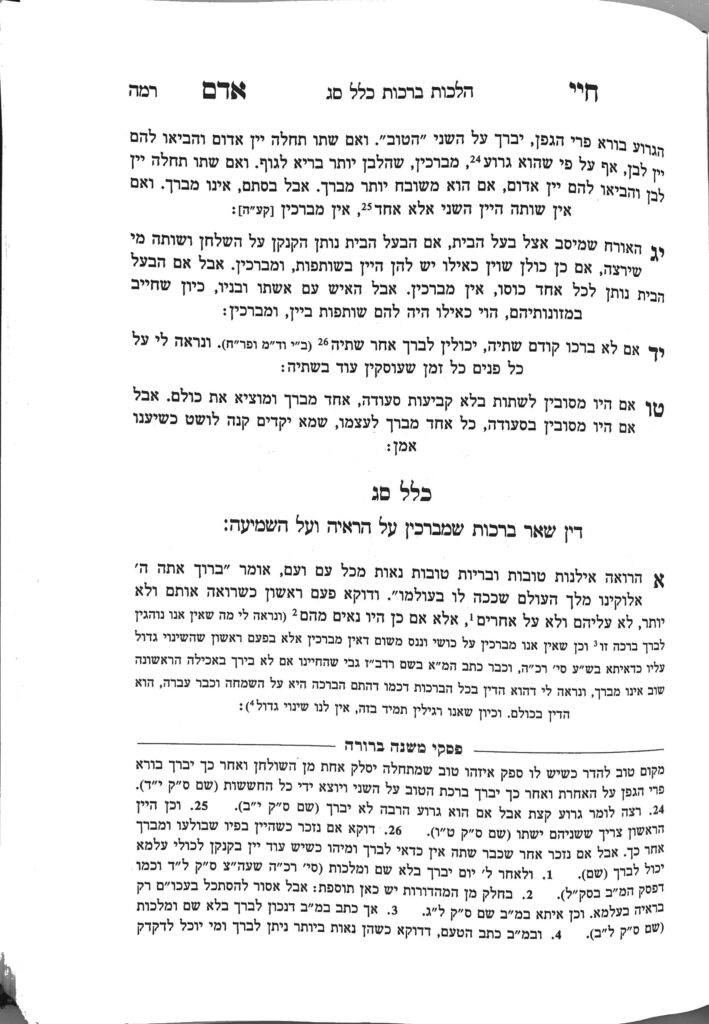We have finished Klal 62 and have a few more points to clarify.
We left off discussing the concept of shomeiah k’oneh. We learned that mideoraysa, anyone can be yotzei any bracha through the concept of shomeiah k’oneh, but the Rabanan placed certain limits. Today, we will learn how those limits apply to being motzi others in borei pri hagafen.
During the times of Chazal, a k’vius for a meal would be created by people joining together in haseivah (reclining together), or by deciding to join together for a meal. Nowadays, we accomplish k’vius by sitting together around a table. If people are not sitting at the same table, or are sitting at the same table but are not eating together, they are not considered as having a k’vius together.
In regards to one person being motzi others in borei pri hagafen, Chazal required that the group have a k’vius. If people are not sitting at the same table, or are sitting at the same table but not eating together, one cannot be motzi others in their bracha. Thus, the discussion yesterday between the Shulchan Aruch and Rema about whether one should be motzi others and preface the bracha with savri only applies to a situation of k’vius, because otherwise all poskim agree that Chazal do not allow shomeiah k’oneh to work.
In such a case (i.e., where the group has a k’vius, so shomeiah k’oneh theoretically can be employed), the Chayei Adam held in accordance with the Shulchan Aruch that it should not be used and everyone should make their own bracha, due to the safety concern that one of the participants may choke when answering amen. The Rema holds that it still can be done, by prefacing the bracha with savri.
The Biur Halacha adds that once the Rema holds that savri allows for the group to employ shomeiah k’oneh, the advantage of b’rov am hadras melech should incline us to have one person be motzi the group. However, due to the opinion of the Shulchan Aruch that there is a concern for the participants’ safety, there is a strong counterargument. The Biur Halacha concludes that both arguments are valid; therefore, everyone should make their own bracha, but we do not stop someone who wishes to be motzi others
Based on what we have learned, when it comes to kiddush on Friday night, a group joining together for the seuda fulfils the requirements of Chazal to employ shomeiah k’oneh. Additionally, the concern of the Shulchan Aruch is not applicable, since no one is eating at that time. Therefore, the opinion of the Tosefes Shabbos is that one person should make kiddush for everyone. This is the minhag of Litvishe poskim, and is the opinion of Rabbi Reingold.
The Olas Shabbos disagrees, and holds that every person should recite kiddush to themselves, due to the concept of mitzva bo yoser mi’bishlucho, that it is more praiseworthy to fulfill a mitzvah yourself than to appoint an agent to do so. Similarly, the Pri Megadim raises this point regarding the bracha of hamotzi.
The machlokes between these opinions centers on whether shomeiah k’oneh works as shlichus (agency), or whether it works as a partnership. In other words, although one would assume that shomeiah k’oneh is agency from the listeners to the speaker, maybe shomeiah k’oneh can be understood as a speaker and listener who are equally necessary for a conversation to be considered a conversation, even if one party does more of the talking than the other. If shomeiah k’oneh can be understood in the latter form, there is no longer an issue of mitzva bo yoser mi’bishlucho, because the recipients are considered just as actively involved in the mitzvah as the one making kiddush, in the same way that a listener is considered just as actively a part of a conversation as a speaker.
Although the latter thought process is the understanding of the Litvish Poskim, Chassidishe poskim understand that shomeiah k’oneh is shlichus, and therefore pasken in accordance with the Olas Shabbos that every person should make their own kiddush.
Summary
Shomeiah k’oneh can only be employed at a meal when a group has deliberately joined together and created a k’vius (nowadays, this means gathering around a table and preferably being seated).
- Even once these criteria are met, the Shulchan Aruch holds that during a meal, when participants are eating, shomeiah k’oneh should not be applied. The Rema holds that it can be applied, as long as the bracha is prefaced with savri.
- When shomeiah k’oneh is employed outside of a meal, such as kiddush, the Shulchan Aruch and Rema agree that it may be applied.
- Regarding kiddush, the argument can be made that every person should make their own kiddush, due to the concept of mitzva bo yoser mi’bishlucho. Chassidishe poskim follow this opinion. Litvishe poskim do not, and encourage one person to make kiddush for everyone.



